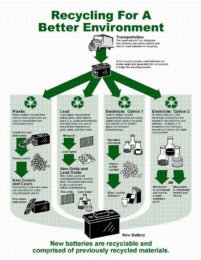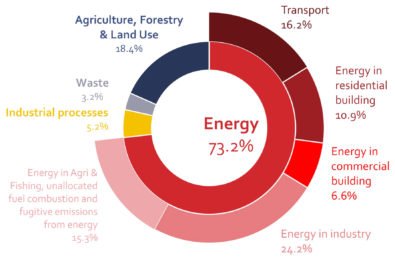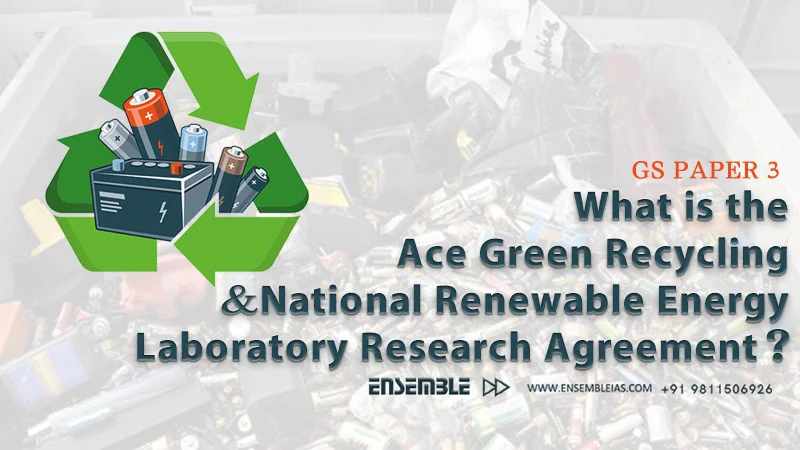Ace Green Recycling and National Renewable Energy
Why in the News?
- A cooperative research and development agreement (CRADA) was signed by Ace Green Recycling, Singapore, and the National Renewable Energy Laboratory of the US Department of Energy (DOE) to advance Ace’s lithium-ion battery recycling technology for the recycling of graphite, lithium iron phosphate (LFP), and other cathode active materials.
- This agreement is all about commitment to developing and deploying breakthrough battery recycling technologies.
- We must show effective procedures that turn low-value materials, such as graphite and iron phosphate, into economically viable products to promote a more all-encompassing approach to recycling. To promote low-cost recycling technology and make the process more efficient and ecologically friendly, we look forward to working with our industry partners.
- The partnership between NREL and ACE is consistent with the objectives of the newly announced Inflation Reduction Act, which seeks to assist the localization of the supply chain for crucial materials within the United States.
- The possible upcycling of graphite obtained via ACE’s technology could reduce the dependence on over 60,000 MT of graphite electrodes.
What is the National Renewable Energy Laboratory?
- NREL is a well-known American research centre devoted to promoting renewable energy and energy efficiency technology. It is run by the Alliance for Sustainable Energy, LLC, a collaboration between Battelle and MRIGlobal, and is situated in Golden, Colorado.
- NREL generate, consume, store and distribute energy.
- The goal of NREL is to create, promote, and deliver the knowledge and innovation required to integrate renewable energy and energy efficiency technologies into the global energy system.
- They are not just giving energy power, they are also generating jobs and supporting the country’s economy.
- NREL research areas are Water, Wind, Solar & and Jio Thermal.
ACE Green Recycling
- A cutting-edge platform for recycling that offers environmentally friendly battery end-of-life options is called ACE Green Recycling.
- To ensure that vital battery materials stay in the nations where battery trash is being produced, the business is collaborating with partners across the battery ecosystem to develop locally tailored circular solutions.
- ACE’s green Recycling method for recycling batteries is an eco-friendly process that produces no waste.

Lithium-Ion Battery
A lithium-ion battery, often known as a Li-ion battery, is a type of rechargeable battery that stores energy by the reversible reduction of lithium ions. Graphite, a type of carbon, is generally used as the negative electrode in a standard lithium-ion battery.
lithium-ion batteries are commonly used in a wide range of consumer electronic devices and applications.
- 1. EV Cars
- Smartphones & Laptops
- Cameras & Wearable Devices
- Cordless Phones or power tools:
- E-cigarettes and Vape Pens
- Bluetooth Headphones and Earbuds
- Portable or remote-control Games
- Electric Shaver and Power Bank
- Bluetooth Headphones and Earbuds
- Electric Toothbrush
- Remote, Watches

Impact
The impact of human life on Lithium-ion batteries is significant. These batteries have become popular due to their high energy density, rechargeability, and relatively lightweight and small size. While we cannot stop using them in our day-to-day lives, we must find better ways to dispose of them. Batteries pose a threat to animals, the environment, and garbage teams if we throw them away carelessly. However, we can recycle each battery, so instead of throwing them away, we should all make an effort to give them to recycling centres.
Conclusion
This agreement is a big step towards a green environment. Recycling centres, government authorities, and battery manufacturers should spread more awareness. Each individual has to be active to reduce the necessary usage of battery-operated products.
Best Online Coaching for Civil Service_IAS_ UPSC_IFS_IPS
Free Study Material ENSEMBLE IAS ACADEMY | Call +91 98115 06926 |
Visit us: – https://ensembleias.com/ | Online Store: https://online.ensemble.net.in/
#ACE #GreenRecycling #India #ACE_GREEN_RECYLING #trends_in_science #explore_page #National_Renewable_Energy_Laboratory #indian_government #saveenvironment #Upsc_current_affairs #news #Batteryrecycle #GSPaper #UPSC #ias #upsc_exam #civilservices #civil_services_study #ensemble_ias_academy #geography_optional #CJI #ias #upsc_exam #upsc_motivation #upsc_aspirants





